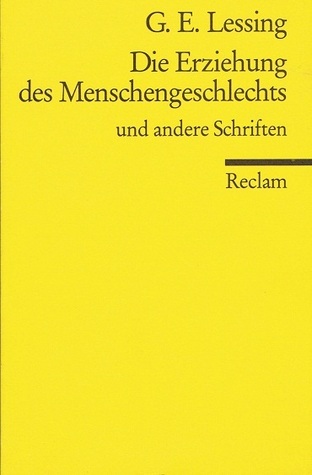
Vorbericht des Herausgebers. Ich habe die erste Hälfte dieses Aufsatzes in meinen Beyträgen bekannt gemacht. Itzt bin ich im Stande, das �brige nachfolgen zu lassen. Der Verfasser hat sich darum auf einen Hügel gestellt, von welchem er etwas mehr, als den vorgeschriebenen Weg seines heutigen Tages zu übersehen glaubt. Aber er ruft keinen eilfertigen Wanderer, der nur das Nachtlager bald zu erreichen wünscht, von seinem Pfade. Er verlangt nicht, dass die Aussicht, die ihn entzücket, auch jedes andere Auge entzücken müsse. Und so, dächte ich, könnte man ihn ja wohl stehen und staunen lassen, wo er steht und staunt! Wenn er aus der unermesslichen Ferne, die ein sanftes Abendroth seinem Blicke weder ganz verhüllt noch ganz entdeckt, nun gar einen Fingerzeig mitbrachte, um den ich oft verlegen gewesen! Ich meyne diesen.�Warum wollen wir in allen positiven Religionen nicht lieber weiter nichts, als den Gang erblicken, nach welchem sich der menschliche Verstand jedes Orts einzig und allein entwickeln können, und noch ferner entwickeln soll; als über eine derselben entweder lächeln, oder zürnen? Diesen unsern Hohn, diesen unsern Unwillen, verdiente in der besten Welt nichts: und nur die Religionen sollten ihn verdienen? Gott hätte seine Hand bey allem im Spiele: nur bey unsern Irrthümern nicht?
Author

Gotthold Ephraim Lessing was a German writer, philosopher, dramatist, publicist, and art critic, and one of the most outstanding representatives of the Enlightenment era. His plays and theoretical writings substantially influenced the development of German literature. He is widely considered by theatre historians to be the first dramaturg. Lessing was born in Kamenz, a small town in Saxony. His father was a clergyman and the author of theological writings. After visiting Latin School in Kamenz (from 1737 onwards) and the Fürstenschule St. Afra in Meissen (from 1741 onwards) he studied theology and medicine in Leipzig (1746–1748). From 1748 to 1760 he lived in Leipzig and Berlin and worked as reviewer and editor for, amongst others, the Vossische Zeitung. In 1752 he took his Master's degree in Wittenberg. From 1760 to 1765 he worked in Breslau (now Wrocław) as secretary to General Tauentzien. In 1765 he returned to Berlin, only to leave again in 1767 to work for three years as a dramaturg and adviser at the German National Theatre in Hamburg. There he met Eva König, his future wife. In 1770 Lessing became a librarian at the Herzog-August-Bibliothek in Wolfenbüttel. His tenure there was interrupted by many travels. For example, in 1775 he journeyed to Italy accompanied by Prince Leopold. In 1771 Lessing was initiated into Freemasonry in the lodge "Zu den drei Rosen" in Hamburg. In 1776 he married Eva König, who was then a widow, in Jork (near Hamburg). She died in 1778 after giving birth to a short-lived son. On 15 February 1781, Lessing, aged 52, died during a visit to the wine dealer Angott in Brunswick. Lessing was also famous for his friendship with Jewish-German philosopher Moses Mendelssohn. In his celebrated biography of Mendelssohn's famous grandson, Felix, Larry Todd describes their friendship as one of the most "illuminating metaphors [for] the clarion call of the Enlightenment for religious tolerance". Lessing was a poet, philosopher and critic. His theoretical and critical writings are remarkable for their often witty and ironic style and their unerring polemics. Hereby the stylistic device of dialogue met with his intention of looking at a thought from different angles and searching for elements of truth even in the arguments made by his opponents. For him this truth was never solid or something which could be owned by someone but always a process of approaching. Early in his life, Lessing showed interest in the theatre. In his theoretical and critical writings on the subject—as in his own plays—he tried to contribute to the development of a new bourgeois theatre in Germany. With this he especially turned against the then predominant literary theory of Gottsched and his followers. He particularly criticized the simple imitation of the French example and pleaded for a recollection of the classic theorems of Aristotle and for a serious reception of Shakespeare's works. He worked with many theatre groups (e.g. the one of the Neuberin). In Hamburg he tried with others to set up the German National Theatre. Today his own works appear as prototypes of the later developed bourgeois German drama. Scholars generally see Miß Sara Sampson and Emilia Galotti as the first bourgeois tragedies, Minna von Barnhelm (Minna of Barnhelm) as the model for many classic German comedies, Nathan the Wise (Nathan der Weise) as the first German drama of ideas ("Ideendrama"). His theoretical writings Laocoon and Hamburg Dramaturgy (Hamburgische Dramaturgie) set the standards for the discussion of aesthetic and literary theoretical principles. Lessing advocated that dramaturgs should carry their work out working directly with theatre companies rather than in isolation. In his religious and philosophical writings he defended the faithful Christian's right for freedom of thought. He argued against the belief in revelation and the holding on to a literal